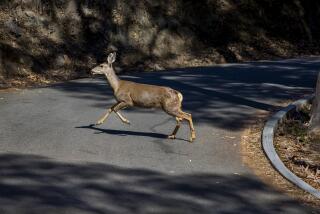BOOK REVIEW : The Evolution of Darwinism in America : IN SEARCH OF HUMAN NATURE: The Decline and Revival of Darwinism in American Social Thought <i> by Carl N. Degler</i> ; Oxford University Press $24.95, 399 pages
- Share via
In 1978, three years after the publication of “Sociobiology: The New Synthesis,” its author, Edward O. Wilson, was confronted at a meeting of the American Assn. for the Advancement of Science (AAAS) by a host of agitators, one of whom poured ice water over Wilson’s head.
Sociobiology, needless to say, had polarized a large part of American biology.
But the British welcomed Wilson’s hypotheses about the way biological factors determine behavior in species as diverse as bees and elephants. Abroad, evolutionary biologists at both ends of the political spectrum found the furor in America hard to understand.
Now Carl Degler, a Pulitzer Prize-winning American historian, explains the emotions behind the debate in the United States. “In Search of Human Nature” chronicles the peculiar history of Darwinism in America across the biological and social sciences. Drawing on the substantial historical and primary literature in the sciences of evolutionary biology and genetics as well as in anthropology, psychology, sociology, political science and philosophy, Degler has produced a brilliant synthesis of our national preoccupation with the nature of human beings and what that has meant in our democracy.
Starting with Victorian England, Degler makes the crucial point that Darwin’s “On the Origin of Species” and later “Descent of Man” touched on that most sensitive of all Western shibboleths: the inherent superiority and separateness of humans from non-human animals. In searching for a distinctively “human” nature, anti-Darwinians rejected the idea that humans share a common ancestor, in terms of behavior as well as body size and shape, with apes. (The idea is now supported by molecular biological evidence that chimpanzee DNA is a 99% matchup with our own.)
Whatever Darwin intended, the theory of natural selection quickly percolated into popular culture as Social Darwinism: the notion that the more talented humans rise in society, while the rest find their natural place.
The companion to natural selection, artificial selection--refined to an art in the 19th Century in the breeding of horses and dogs--was soon extrapolated to people and given the name eugenics. The plan was to improve the human “breed” by encouraging the “fit” to procreate while discouraging the unfit. In the United States the “unfit” were often found among immigrants and former slaves. In 1913, an Oberlin college professor wrote that bearing children was a privilege, not a right, and by the 1930s eugenic laws had forced the sterilization of thousands of American women.
But even while eugenics thrived, major figures in the social sciences argued that culture (read: nurture or environment ) is the real determinant of behavior. The rapid climb of immigrant groups belied predictions based on the behavior of the first American generation.
Degler points out, nevertheless, that the new social scientists had an agenda. Columbia University anthropologist Franz Boas unabashedly wrote that he “had a deep interest in collecting evidence and designing arguments that would rebut or refute an ideological outlook--racism--which he considered restrictive upon individuals and undesirable for society.”
By the late ‘30s, psychologists John B. Watson and B. F. Skinner were suggesting that everyone had the potential to do almost anything--provided they were they raised in the right environment.
Recently, many of Darwin’s theories have been supported by advances in ethology, sociobiology and molecular biology: nature may indeed prove more decisive than nurture. But few scientists foresee single-gene explanations for complex behavioral traits. Genetics and developmental biology are both revealing complexity, as well as interaction between development and environment.
The agitator mentioned above who interrupted the AAAS meeting in 1978 had good historical reasons to fear the political fallout of theories about genetics determining character. Degler suggests that a better understanding of the continuity between animal nature and human nature will eliminate any real threat. Perhaps, but ignorance and prejudice find ammunition where they can.
Still, it is hard to disagree with Degler’s conclusion that research in the sciences has slowly eroded what remains of the once-solid wall between human beings and the rest of the animal world. Darwin’s view of continuity was astonishingly right.
Next: Jonathan Kirsch reviews “The Litigation Explosion” by Walter K. Olson (Dutton).
More to Read
Sign up for Essential California
The most important California stories and recommendations in your inbox every morning.
You may occasionally receive promotional content from the Los Angeles Times.













